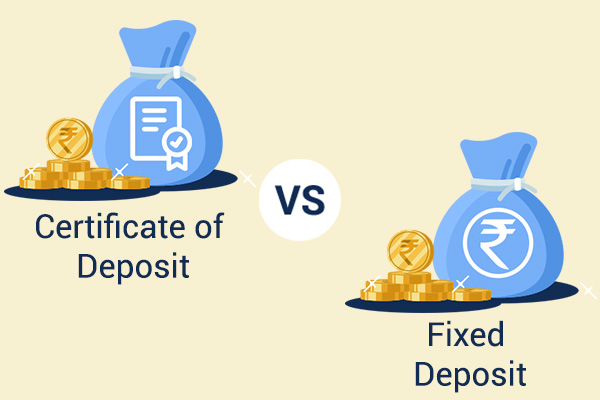Certificate of Deposit Vs Fixed Deposit

Deciding where to invest your money is challenging. You may make your money work harder for you by increasing your capital’s return on investment. Various financial choices may assist you in doing this, even though it may seem like a bit of a dilemma at first.
One could put their money in stocks, bonds, or mutual funds. People could also opt for commodities, real estate, or private equity.
The safest bet is to park one’s money in a safe, stable investment like a certificate of deposit or fixed deposit.
While both offer fixed returns, stability, and liquidity, there are some differences between them. This post will summarize the difference between certificate of deposit and fixed deposit.
What is a Certificate of Deposit?
The full form of CD is a certificate of deposit. It is a short-term money market instrument offered by banks and financial institutions in India. To expand the variety of money market products available in India, CDs were launched in 1989. Investors are now better equipped to handle short-term finances.
A CD is a contract between depositors and the approved bank or financial institution. The depositor lends the money to the bank, and in exchange, the bank provides interest to the depositor for a set time. The bank predetermines the interest rate on a CD.
At the time the instrument reaches maturity, depositors can redeem their funds. However, they cannot draw their funds from a CD before maturity.
CDs are given in a dematerialised format. It is shielded by the FDIC (Federal Deposit Insurance Corporation) and governed by the Reserve Bank of India (RBI), which establishes the rules for purchasing CDs.
Bank-issued CDs must have a maturity period of at least seven days but not more than one year from the date of issuance. Moreover, the minimum investment required for a CD is Rs. 1,00,000, and one can invest in multiples of Rs. 1 lakh after that.The interest rate offered on CDs is higher than on savings accounts, making them more appealing.
What is a Fixed Deposit?
Another financial product offered by banks that may be used to both preserve money and make more money is a fixed deposit.
A fixed deposit (FD) is a term deposit where you can invest money for a specific period and earn a fixed interest rate. FD interest rates are often greater than deposits made to savings accounts.
An FD requires the depositor/customer to make a set investment throughout the FD to receive a fixed interest from the bank. Throughout the FD, the depositor cannot withdraw money. Some banks permit early withdrawals. However, they do charge a fee.
For a period of seven days to twenty years, depositors may place their money in a fixed deposit certificate. The bank that offers fixed deposits calculates the interest rate in advance, and it stays the same during the duration of the FD.
Both cumulative and non-cumulative FD are options for depositors. If the deposit is a cumulative FD, the whole interest amount will be paid out at maturity; if it is a non-cumulative FD, the interest will be paid out over time.
Upon maturity, the bank credits the principal and the interest amount to the customer’s account.
One of India’s top fixed deposit schemes is offered by RBL Bank.
Difference between Certificate of Deposit and Fixed Deposit
CDs and FDs appear to sound identical at first glance. However, the specifics of an FD and CD differ. Here are the criteria to compare certificate of deposit vs fixed deposit.
1. Minimum Investment Amount
One of the significant differences between a certificate of deposit vs fixed deposit is the minimum investment required. A minimum of Rs.1 lakh in a CD must be put. However, the minimum investment for FDs can be as little as Rs.1,000.
2. Return on Investment
Compared to a bank FD, a CD’s interest rates are higher. CDs provide higher rates because of their significant risk than bank deposit plans.
3. Investment Horizon
The maximum duration for CDs is 12 months, allowing investing your money for a short period. In contrast, FDs provide a larger range of tenures, from 7 days to 20 years.
4. Collateral for Loan
CDs cannot be used as collateral when applying for loans and other financial help. However, you can provide FDs as collateral for a loan.
Conclusion
There are a few differences between certificate of deposit and fixed deposits. Depending on the investment amount, time horizon, and risk tolerance, one must decide which one to invest in. To achieve your short-term financial objectives, you can invest in a CD. However, you can think about investing in FDs if you want to generate consistent income on your money over a lengthy period.

 Blog
Blog Blog
Blog



Comments
No comments yet.